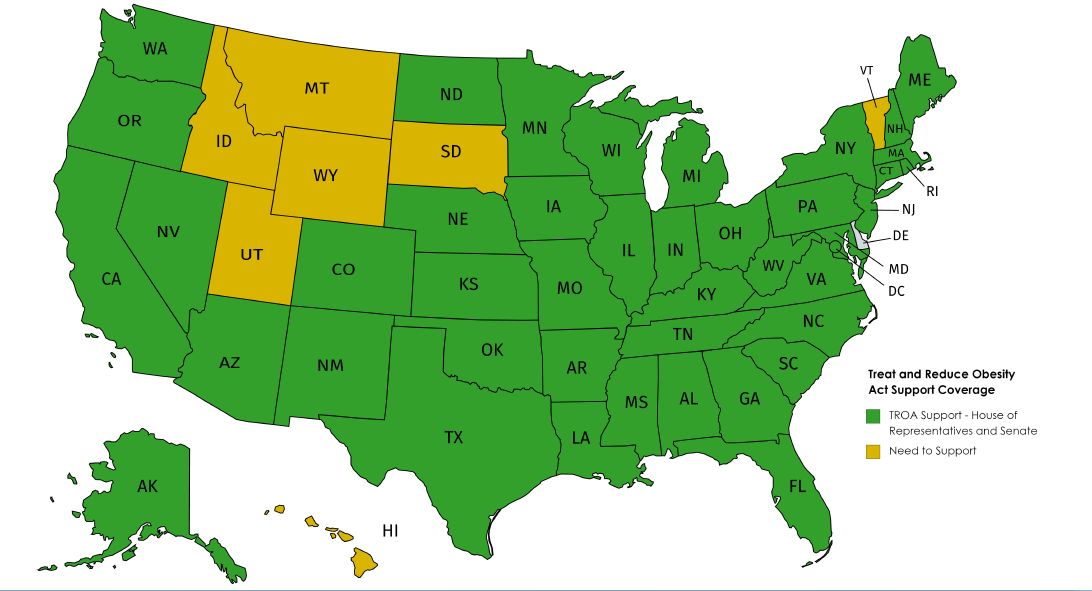For months now, U.S. news headlines have been dominated by politics and the 2020 elections. We know this leaves many in our community asking what these changes mean and what impacts they carry, so the OAC took some time on our November broadcast to break down what you need to know.
Obesity is a Bipartisan Issue
To start, it’s important to know that obesity is a bipartisan issue, meaning that it is relevant to any party. The OAC does advocacy work on both federal and state levels that is supported by Democrats, Republicans, and Independents alike. Obesity can affect anyone regardless of their political beliefs.
How Does the Election Impact Key Obesity Legislation?
 One significant change is the impact on the Treat and Reduce Obesity Act (TROA), which is legislation that has yet to be passed but aims to improve access to healthcare for Medicare beneficiaries affected by obesity. To learn about TROA in greater detail, Click Here.
One significant change is the impact on the Treat and Reduce Obesity Act (TROA), which is legislation that has yet to be passed but aims to improve access to healthcare for Medicare beneficiaries affected by obesity. To learn about TROA in greater detail, Click Here.
Support for TROA has grown significantly over the years to now more than 190 co-sponsors. A co-sponsor is either a House or Senate member who has added their name to a bill in support of its legislation. However, every general election brings changes to the makeup of Congress. After the 2020 election, some of TROA’s co-sponsors were voted out, so advocates must educate incoming legislators about TROA in hopes that they will support it and become a future co-sponsor.
Who Should We Target to Help Pass the Treat and Reduce Obesity Act?
TROA has broad support across the county with roughly 43 states and the District of Columbia who have a member of their delegation co-sponsoring the Treat and Reduce Obesity Act (TROA). Only a handful of states do not have support for TROA (see graphic below and click to view larger in a new tab).
Health advocates are aiming to target the following key states for support for TROA because they have legislators in their state delegation with high influence:
- California: Energy and Commerce Health Subcommittee Chair, Anna Eshoo (D-CA)
- Iowa: Senate Finance Committee Chair, Chuck Grassley (R-IA)
- Massachusetts: Ways and Means Committee Chair, Richie Neal (D-MA)
- New Jersey: Energy and Commerce Committee Chair, Frank Pallone (D-NJ)
- Oregon: Senate Finance Committee Ranking Member, Ron Wyden (D-OR)
- Texas: Ways and Means Health Subcommittee Chair, Lloyd Doggett (D-TX)
If any OAC members live in one of these key target states or a state where TROA does not currently have a co-sponsor, please use the OAC Action Center to reach out to your elected officials and encourage them to support TROA!
How Does the Election Impact People with Pre-existing Conditions?
One of the most important provisions of the Affordable Care Act (ACA) is the pre-existing condition clause, which essentially lets patients gain access to insurance if they have a pre-existing condition. This is particularly important to people who have obesity and are seeking help with care or treatment.
Within the past few months, the future of the ACA has been in question as the Supreme Court took up a critical case about it. However, oral arguments from the justices appear to show that the ACA will be sticking around for a while, but we won’t know more until the court issues its ruling in the spring or summer of 2021. What we do know is that the incoming Biden-Harris administration has talked about strengthening the ACA to ensure patient protections such as the pre-existing condition clause.
What about Obesity and COVID-19?
Another relevant issue in the current landscape is the link between obesity and COVID-19 severity. Research has shown that overweight and obesity increase one’s risk of having complications from COVID-19 or being hospitalized due to health conditions related to obesity.
This connection is also important for COVID-19 vaccines. The OAC and other health advocates have reached out to the scientific community that develops the priority list for the new vaccines. Thankfully, this group has recommended that people with obesity should be considered on the priority list under the umbrella of patients with other chronic health conditions. The OAC has also reached out to pharma companies to encourage them to include people with obesity in their vaccine trials since they represent more than 93 million Americans.
Want More Information?
For more information on politics, policies, and the current landscape for obesity, Click Here to watch the November episode of OAC’s new monthly broadcast.

